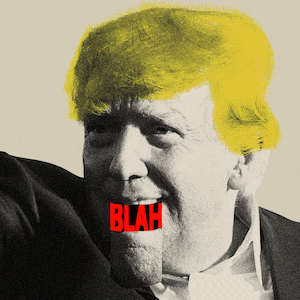Donald Trump is, once again, outmaneuvering the American court system.
No, his New York bank fraud trial is unlikely to end favorably for the former president. But that trial is quickly becoming a blueprint for defying gag orders—an issue that will only become more pressing as several criminal cases loom on the horizon.
Trump’s strategy has been simple: say whatever he wants, inspire a gag order, appeal the decision, and even if the gag order is upheld, refuse to delete the social media posts he made during the confusion.
Trump then watches his old posts take on a life of their own, inspiring violent threats against his intended targets while he quietly sits by.
Due to a layered series of court appeals, it’s an open question whether the Republican 2024 frontrunner is technically violating the law. But he’s essentially gotten away with ignoring the restriction.
Catherine Ross, a professor emeritus at George Washington University Law School, said the situation is clearly a preview of what’s to come as Trump faces criminal trials in Washington, New York, South Florida, and possibly even Georgia next year.
“Absolutely. We can fully expect anything that Trump thinks worked for him once, he will use again. He is testing, he is refining, and one would even speculate that he is issuing warnings to other judges: ‘You can’t tie me down. I’m impervious,’” she told The Daily Beast.
The nature of the larger threat was explicitly laid out on Friday, when a federal appellate court in Washington warned that in the D.C. case “some aspects of Mr. Trump’s public statements pose a significant and imminent threat to the fair and orderly adjudication of the ongoing criminal proceeding, warranting a speech-constraining protective order.”
But his ongoing bank fraud trial in New York shows that he knows no bounds.
In Manhattan, the former president has been repeatedly ordered to remove online statements verbally harassing Justice Arthur F. Engoron’s right-hand legal adviser, law clerk Allison Greenfield. The billionaire-turned-politician’s heated rhetoric has inspired his vengeful MAGA battalion to inundate the court with death threats.
He already paid a $15,000 fine for his intransigence, having refused to delete past posts. But he’s in the same situation again.
By fighting the judge’s initial order, scoring a temporary win on appeal, then ultimately losing the battle last month, Trump created enough confusion in the interim that he managed to dish out attacks during the brief lifting of the gag order without facing repercussions.
Even though the gag order demanded that he delete every mention of Greenfield, several of his recent statements remain on his Truth Social media network—and keep getting shared thousands of times.
His Nov. 30 post, which is still up, fumes about the “very disturbed and angry law clerk” having “control of the New York State Witch Hunt Trial.” The comment drew more than 1,000 comments of mixed reactions ranging from full-throated support to warnings that his continued attacks will land him in jail.
His Nov. 21 screed, also still up, complains about the way the “horrendous, seething with ANGER Law Clerk, with her illegal campaign contributions, will find me guilty as hell.”
Among the 1,600 responses are several calls for ultimate vengeance against the “deep state” going after Trump—as well as warnings that the billionaire is clearly gaming the legal system.
“Trump sure is taking advantage of the gag order being paused by the appeals judge,” one commenter noted.
Others have used Trump’s public ire to coordinate a campaign to flood the New York State Commission on Judicial Conduct with spurious complaints aimed at Engoron and Greenfield, with one account sharing a copy of an official response from the agency.
This tactic isn’t just reserved for average Trump loyalists. It was adopted last month by Rep. Elise Stefanik (R-NY), who filed a formal complaint with the commission. (It wasn’t the first time the congresswoman—who appears to be vying for a spot as Trump’s 2024 vice presidential running mate—has weighed in on the trial. She recently used her position on the House Intelligence Committee to ask the Justice Department to criminally investigate an AG witness, former Trump lawyer Michael Cohen.)
In a response to The Daily Beast, the New York judicial conduct commission would not disclose how many of these complaints have been filed, citing state secrecy rules.
It’s rare enough to have someone personally attack a judge—much less their court staff. But when it happens, a judicial gag order is typically more than enough to shut them up. The Republican political operative Roger Stone, an on-and-off Trump associate, famously had to apologize for violating a gag order after he very stupidly posted a picture of a federal judge with crosshairs threateningly superimposed near her face.
But Trump, a billionaire with a long history of weaponizing his wealth to engage in vexatious litigation, has employed lawfare tactics during his ongoing trial against New York Attorney General Letitia James—seizing on the confusion of a gag order that keeps expanding and getting reinstated.
When Justice Engoron caught him delivering irate speeches outside the courtroom maligning his law clerk, the judge imposed a gag order on just the second day of trial in October. In court, Engoron warned that “personal attacks on members of my court staff are unacceptable” and issued an order “forbidding all parties from posting, emailing, or speaking publicly about any members of my staff.” That was Round One.
A few weeks later, Engoron was alerted to the fact that Trump’s 2024 campaign website had neglected to take down a post lying about Greenfield’s personal life. Engoron fined him $5,000 and threatened him with prison time. “This court is way beyond the warning stage,” Engoron said.
That was Round Two.
In late October, the ever-defiant presidential hopeful ignored the gag order when he delivered an impromptu speech outside the courtroom yet again, this time complaining obliquely about the “person who’s very partisan sitting alongside of [Engoron.]” The judge yanked him onto the witness stand, forcing him to testify and concluding that Trump’s implausible defense—that he was directing his ire at Michael Cohen, not Greenfield—wasn’t convincing. Engoron said Trump’s explanation was “not credible,” and fined him another $10,000.

Former President Donald Trump gestures while leaving the courtroom during a break, as he attends the Trump Organization civil fraud trial.
Mike Segar/ReutersDays later, when Trump lawyers Christopher Kise and Alina Habba started insultingly whining about the clerk in court, Engoron took the remarkable decision to expand the gag order to the legal defense team, too.
But when they appealed the gag order and scored a temporary pause with Associate Justice David Friedman on Nov. 16, Trump immediately resumed hostilities.
“His Ridiculous and Unconstitutional Gag Order, not allowing me to defend myself against him and his politically biased and out of control, Trump Hating Clerk, who is sinking him and his Court to new levels of LOW, is a disgrace,” Trump posted as soon as the muzzle was lifted.
He kept up the attacks until a full appellate panel reviewed that ruling on Nov. 30 and put the muzzle back on.
But Trump never deleted the posts he made during the two weeks when he was off the leash. Quite the opposite; Trump has since begun launching attacks against Engoron’s wife and son, sharing dubious assertions by QAnon conspiracy theorist and proud Islamophobe Laura Loomer.
But amid all the confusion of the gag order, Trump and his lawyers could argue that his posts during the period when the order was paused shouldn’t be subject to the original silencing. And it’s that nebulous in-between where Trump is trying to live—even if his argument is tenuous to legal experts.
Ross, the GWU law professor, noted that the original gag order clearly told Trump to take down his rage posts—and that the appellate judge who briefly paused that gag order didn’t actually revoke it, he merely paused it. That means that the full appellate panel that reinstated the gag order concluded that it was legitimate from the moment it was issued. So, keeping the ones he published in the interim is in clear violation of the order—and certainly violating the spirit of the judicial decree.
“My view is, it should be taken down. It’s exactly parallel to what happened initially where he did not remove something he had been ordered to remove. The burden should not be on the judge to go out and look everywhere to see what violations Trump committed and left up,” she said.
Although the trial is nearing its end, the issue isn’t a moot point. Trump was scheduled to testify on Monday, and the former president and his lawyers appear to have reversed themselves on his testimony, indicating that their client wouldn’t feel able to speak freely without violating the gag order.
The prospect is already a dangerous one. The fierce loyalty of his MAGA fanatics has been on full display, with a flood of death threats made on Engoron and Greenfield that immediately followed his rage posting and was documented in sworn statements by court security staff. One caller left a voicemail swearing to “hunt down… you and your family.” Another mused, “I mean, honestly, you should be assassinated. You should be killed.”
Engoron’s reluctance to jail Trump despite his repeated transgressions appears to have emboldened the real estate tycoon. Legal scholars told The Daily Beast that’s partly because of the civil nature of the ongoing bank fraud trial, because Trump isn’t a criminal defendant out on bail who has explicitly given up certain civil rights.
It’s a very different situation for the two federal judges and two state judges overseeing Trump’s upcoming criminal trials across the Eastern Seaboard. In those cases, Trump is enjoying a delicate freedom ahead of his trials that could be revoked at any time.
In Washington, District Judge Tanya Chutkan has already issued a gag order forbidding Trump from threatening witnesses and Justice Department Special Counsel Jack Smith. In Manhattan, Justice Juan Merchan has issued a protective order strictly limiting how Trump could publicly discuss evidence that could intimidate witnesses or prosecutors. In Atlanta, the bond agreement Trump signed to stay out of Fulton County jail made him promise to “perform no act to intimidate” any co-defendant or witness.
One wrong step, and Trump could find himself remanded behind bars.
But legal observers say that’s unlikely, given the extreme civil unrest that could follow. Trump is not the average defendant, regardless of the American ideals of equal application of the law.
“If you have someone who is unwilling to demonstrate respect for the litigation process and to court officials—and who has the platform to manifest disrespect in ways that are potentially harmful to those officials through speech—I think it’s very difficult for a judge to address the problem,” said Aziz Z. Huq, a professor at University of Chicago law school.
“Is there a way that the court has to extinguish these kinds of attacks? The answer is, in the ordinary court, yes. But here, it’s really hard to see how that gets implemented. I don’t expect the former president’s bail to be revoked. Therefore, I don’t expect these gag orders to have much practical effect,” he added.
The better approach, Huq said, is for judges to target Trump’s lawyers instead.
“Courts have more power to regulate lawyers than they do the parties. If a lawyer does something in the courtroom, it’s very clear the courts have inherent authority to hold them in contempt,” he said.
That bolsters Ross’ view that in New York right now, the burden is on Trump’s legal team to pressure their own client—as improbable as that seems.
“The lawyers should be telling Trump, ‘You have to remove this,’” she said.









